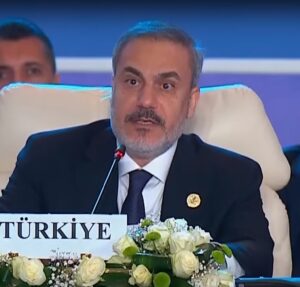Abdullah Bozkurt/Stockholm
Turkish intelligence services, operating out of embassies and consulates in the West, have expanded their spying operations in foreign territories, targeting critics and opponents of the government of President Recep Tayyip Erdogan.
The aggressive campaign of covert operations, including surveillance, information gathering and mapping out daily routines of targets in dozens of countries in Western Europe and North America, is believed to be a precursor to further action by Turkish agents that may even include violent and deadly acts.
According to a classified Turkish government document, dated January 25, 2024, Turkish spies have been actively gathering information in the West and relaying reports to their headquarters in Ankara.
The eight-page document, obtained by Nordic Monitor, reveals just the tip of the iceberg in a vast spying operation conducted by multiple Turkish intelligence services across dozens of foreign countries.
The document, which lists 82 unsuspecting individuals as targets, encompasses only those assigned to the Security Directorate General (Emniyet) Ankara branch. This implies that in total, thousands of people were profiled, and their information was subsequently disseminated to an additional 80 provinces for further investigation.
The document mentions countries such as the US, Canada, United Kingdom, Germany, France, Poland, Belgium, the Netherlands, Switzerland, Luxembourg and Norway. Additional countries are covered in related documents.
Document prepared by the Security Directorate General reveals the countries in the West that Turkish intelligence services have carried out spying activities (identifying information was redacted by Nordic Monitor due to privacy concerns):
The cover page attached to the document, signed by Police Chief Engin Aydın in Ankara, has an order for the police to conduct further investigations into the individuals whose names were collected abroad. This suggests that those profiled in foreign countries could potentially face sanctions in Turkey, including legal troubles, administrative penalties, asset seizures and harassment of friends and family members who reside in Turkey.
The utilization of Turkish embassies and consulates as intelligence hubs accelerated significantly following Hakan Fidan’s appointment as foreign minister in summer 2023. Fidan, who previously served as the head of the country’s notorious intelligence agency, the National Intelligence Organization (Milli İstihbarat Teşkilatı or MIT), for a decade, played a significant role in assisting the Erdogan government with activities such as false flag operations, influence campaigns and the abduction of critics for interrogation under torture at undisclosed black sites.
Fidan brought several senior intelligence officers with him from MIT and strategically positioned them in key roles in the foreign ministry, effectively transforming the diplomatic service into an important intelligence apparatus.

The foreign ministry’s covert intelligence unit, the Security and Research Directorate (known as Araştırma ve Güvenlik İşleri Genel Müdürlüğü in Turkish), underwent a restructuring, with Fatma Ceren Yazgan, a longtime operative of Turkish intelligence, appointed to lead the directorate. Yazgan played a pivotal role in profiling Turkish ambassadors and diplomats, ultimately resulting in the summary and abrupt removal of one-third of Turkish diplomats from the foreign service in 2016.
President Erdogan has increasingly depended on intelligence services to maintain his repressive regime in Turkey, suppress critical voices and crack down on opposition groups. The increased surveillance and intelligence gathering activities abroad are aimed at intimidating opponents overseas, perpetuating a climate of fear among Turkish diaspora groups and influencing the foreign and domestic policies of the host countries.
Intelligence experts who spoke with Nordic Monitor believe that the surveillance, information collection and mapping of routines of targeted critics may indicate that Turkish authorities are considering escalating their operations abroad, potentially involving violence, kidnapping and even assassination.
In the last decade MIT has been implicated in multiple plots in Europe and the US, which included murder, kidnapping attempts, intimidation campaigns and influence operations. In a noteworthy incident in 2013, three women affiliated with the Kurdistan Workers’ Party (PKK) — Sakine Cansız, Fidan Doğan and Leyla Söylemez — were executed in Paris reportedly on orders from MIT.
The hit was believed to have been contracted to Ömer Güney, an insider who was recruited by MIT. A voice recording posted online in January 2014 featuring Güney’s voice suggested that the order for the murders came from MIT. In the recording Güney can be heard conversing with two MIT officials at different times, providing them with detailed information about his plans and preparations for the murders.
The Erdogan government was even reported to have plotted to abduct Fethullah Gülen, a Turkish cleric residing in the US who inspired the Gülen movement, as revealed by The Wall Street Journal in November 2017. Gülen has been critical of the Erdogan government on various issues, including corruption within Turkey’s administration and Turkey’s support for radical jihadist groups.
The cover page that was signed by a police chief at the Security Directorate General in Ankara reveals the names of people who were spied on in Western countries by the Turkish intelligence services (identifying information has been redacted by Nordic Monitor due to privacy concerns):
Kamil Ekim Alptekin, a Turkish government operative who was indicted in December 2018 by US federal prosecutors, attempted to conduct surveillance on opponents of President Erdogan in Washington, D.C. Alptekin’s covert activities on US soil on behalf of the Erdogan government came to light during the trial of his associate, Bijan Rafiekian, who was convicted of acting as an undisclosed agent of the Turkish government in the US.
The plot included using the services of the Flynn Intel Group (FIG), a company founded by Rafiekian and retired general Michael Flynn to publicly and privately influence US politicians and public opinion, according to a statement released by the US Department of Justice.
Testifying as a government witness at Rafiekian’s trial on July 17, 2019 in the US District Court for the Eastern District of Virginia, Brian McCauley, a former deputy assistant director of the FBI, revealed how Alptekin asked him to plant incriminating evidence against Gülen and run surveillance on Erdogan critics in the Washington, D.C., area.
A report released by the German federal government in July 2023 identified Turkey as the sole NATO ally that conducts espionage and intelligence activities on German soil, deemed a threat to Germany’s constitutional order and social cohesion and raising significant concerns about national security and the relationship between the two countries.
The 380-page report issued in July by the Federal Ministry of the Interior and Community (Bundesministerium des Innern und für Heimat, BMI) listed Turkey along with Russia, China, North Korea and Iran as “the main actors in espionage targeting Germany, cyber attacks directed by intelligence services, [arms] proliferation and influence operations.”

According to the report Turkey and others use their intelligence services to acquire information, exert influence, monitor their critics or pursue other interests, mainly because of Germany’s role in the EU, NATO and other international organizations.
In the view of the German interior ministry, the Turkish intelligence service and security authorities are integral parts of the Turkish government apparatus. They are seen as playing a crucial role in assisting President Erdogan and his ruling Justice and Development Party (AKP) in implementing their policy decisions.
The German interior ministry believes the large Turkish community in Germany presents unique opportunities for Turkish intelligence to gather information. It also underlined that the substantial diplomatic presence maintained by Turkey is another opportunity to obtain information in Germany.
Similarly, Sweden’s intelligence service, Säpo, issued a warning in its annual report on February 21 stating that foreign powers were systematically targeting Sweden for activities such as “mapping of opposition groups, attempts to influence Swedish decision-making, and planning of attacks against individuals in Sweden.” While Turkey was not explicitly named in the report, it was strongly implied that Swedish intelligence was monitoring the activities of Turkish agents and their proxies operating on Swedish territory.
According to Swedish media reports, Säpo has investigated such activities in the past, particularly in connection to the surveillance of individuals who are alleged to have been linked to the Gülen movement, a group that is opposed to the Erdogan government.

German authorities have responded to the intensified spying activities conducted on behalf of the Turkish intelligence services by taking action against operatives associated with the Erdogan government. This included legal measures against individuals such as a former advisor to President Erdogan.
A Turkish national was convicted by the Düsseldorf Higher Regional Court on July 14, 2022 for acting as an intelligence agent and illegally acquiring and possessing ammunition. Similarly, the conviction of a German national on November 10, 2022 who acted as an informant for the Turkish intelligence service was another instance in which the Erdogan government was exposed for illegal spying activities on German soil.
In 2015 Germany’s federal attorney general charged Muhammet Taha Gergerlioğlu, a close advisor to Erdogan and a MIT operative, with espionage because he and two of his associates collected information on people of Turkish origin living in Germany who were critical of the Turkish government. Gergerlioğlu was later released as part of a political bargain between Turkey and Germany.
Two Turkish diplomats, then-press attaché Hacı Mehmet Gani and Hakan Kamil Yerge, then-second secretary at the Turkish Embassy in Bern, plotted to drug and kidnap a Swiss-Turkish businessman in 2016. In June 2018 the Office of the Attorney General of Switzerland issued arrest warrants for the two Turkish diplomats and confirmed that they would be arrested upon their entry into Switzerland. According to local reports, criminal proceedings against the two diplomats were launched in March 2017. Yerge left Switzerland in November 2016, whereas Gani remained until August 2017.
The Turkish diplomats were accused specifically of having gathered political intelligence for another state and of having attempted to kidnap a Swiss businessman with Turkish roots. The businessman was reportedly affiliated with the Gülen group and had been living in Switzerland for some 30 years.
In December 2021 the Special Department of the Court of Appeals in Kosovo upheld a previous decision by the Special Department of the Basic Court of Pristina concerning the kidnapping in March 2018 of six critics of President Erdogan from Kosovo by Turkish agents and their accomplices within Kosovo government institutions, which violated local laws.
Following the incident, a crisis erupted in Kosovo, prompting the prime minister to declare that he had not been informed in advance of the operation, immediately dismissing the interior minister and security chief.
Ultimately, the former heads of the Kosovo Intelligence Agency, the Department for Citizenship, Asylum and Immigration in the Ministry of Internal Affairs, and the Directorate for Migration and Foreigners in the Kosovo Border Police were indicted and convicted for their involvement in the abduction.
The recent documents obtained by Nordic Monitor make it clear that actions taken by European countries and North America thus far have not deterred the Erdogan government from continuing its covert operations. Instead, more Turkish spies have been dispatched abroad, many under diplomatic cover, to continue intelligence gathering activities on foreign soil.












